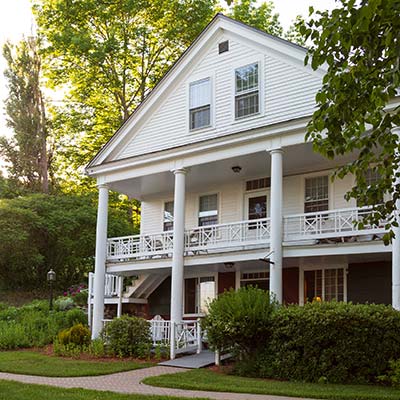by Doug Carleton of Business Lenders, LLC
Financing for any startup business is hard for obvious reasons. A lender is gambling. It is betting that the owner of the startup business is going to be able to meet projections and pay back the loan. And even though most new business owners do their best, a high percentage fail.
A startup B&B offers an additional challenge – most new owners lack management experience in the lodging or some comparable industry. When a lender finances a startup, what it is really betting on is the management – the owner. Normally, a lender would never provide a startup loan for someone without significant experience in the business he or she is starting. But in the B&B industry, almost no one starting or, for that matter, buying an existing B&B has lodging industry experience
Lodging experience may not seem like such a big deal, and lots of times operating a B&B may seem comparable to having a house full of adolescent teenagers. But although you may have only a small percentage of the number rooms a hotel has – e.g., your 6 rooms are 5% of the 120-room Hampton Inn in town, you both face many of the same issues. And you both sell a product that spoils in one day – room nights. Once room nights are gone they can’t be recovered. They can’t be inventoried like a tangible product to sell later so the revenue is permanently lost. Also, you both have reservations issues, credit card issues, no-shows, etc. And most of all, you both have marketing issues, such as, how are you going to capture enough of the traveling public coming to your area to make money?
Other Startup Issues
Some of the other problems with financing startup B&B’s are:
1. A lender will almost always require a large cash injection – usually a minimum of 30% of the total project cost. The total project cost is usually more than just the real estate acquisition. There may be additional costs such as renovation, which could be substantial depending on the age and condition of the building you are buying, plus the cost of furnishings, decoration, and kitchen equipment. You will also need a certain amount of working capital to carry you through the startup period.
2. Lack of verifiable data regarding room demand and sales.
3. Lack of comparable sales data for appraisals.
4. If the B&B will be your only source of income, everything gets harder because it is not very often that a startup B&B will break even in its first year of operation. So the lender must be convinced that you are going to be able to pay the mortgage and your own bills while building your business.
How Can You Improve Your Chances?
Here are three things that you should pay particular attention to:
The first is a feasibility study/business plan. If you were seeking to finance a new hotel or motel, you would be required to do a feasibility study. Doing a feasibility study for your B&B will give you a chance to prove your case that there is a demand for your rooms at a price that will generate a profit. If the study leaves some doubt, you are better off walking away.
The second is management experience. Assuming that you have never been in the lodging industry, it would be very beneficial for you to consider taking an aspiring innkeeper training seminar. Perhaps even more valuable might be a “boot camp,” where you actually go in and operate an inn under the supervision of the owner. Either of these would show a lender that you are not going blindly into a business that you know little or nothing about.
Management experience in industries that serve the general public face-to-face every day, such as restaurants, for example, is valuable. Experience in owning a business can be very important, also. If you have never owned a business but have had general management responsibility, such as supervising employees or meeting budgets, that can help, too. The point is that since a startup B&B owner probably will not have had previous lodging industry experience, it is important to convince a lender that the experience you do have is adequate to show that you can be successful in the operation of a B&B. It may seem that running a B&B is “not rocket science,” and it’s not. But to a lender committing loan money to you in the six-figure range, who probably doesn’t understand the industry very well to start with, it is rocket science and you need to convince the lender that you can manage the rocket.
The third thing to focus on will depend on how many rooms you plan to have. If you have a property that could easily be converted back to a single-family home, this could be important because lenders are always concerned about their collateral. Residential real estate is usually excellent collateral and, in the case of a B&B, it will probably be a property that is in tip-top shape. So make sure the lender understands that if it ever has to take the property back, it can probably recover most or all of the loan. Obviously, you don’t want to raise the specter of failure to the lender. But at the same time make sure the lender understands that your collateral is something readily marketable to a wide range of buyers, as opposed to a more specialized piece of commercial real estate with a much more limited market.
How Can the SBA Help You?
The SBA can provide a loan guarantee of up to $1,000,000 or 75% of any eligible loan. This could be the difference in whether a lender is willing to make a startup loan or not. A lender might really like everything about your proposal, but just not be willing to take the risk. But if it could get 75% of the loan guaranteed, the risk would be substantially mitigated, so the lender might be willing to go ahead with the loan.
SBA loans offer other advantages to the borrower. Real estate can be amortized up to 25 years, which can help lower the monthly payments – a significant benefit to a startup. Also, there cannot be any balloons, so the loan cannot be called at an inopportune time. All project costs can be combined into one loan, so there would be no need for separate loans for things such as equipment.
Startup B&B’s can be financed. But you need substantial equity, a superb business plan, and maybe a little help from the SBA.





